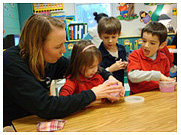Related Services: Common Supports for Students with Disabilities
Wrap Up

The related services that students receive are as individual as the students themselves. They can vary in terms of the type of service (e.g., occupational therapy, transportation, music), the means of delivery, and the frequency and location of the service. Related services can support the acquisition of academic and non-academic skills and the participation in extracurricular activities. Some of the most frequently used related services for students with disabilities and their primary purposes include:
- Speech-language pathology services––Help students who have difficulties with communication
- Occupational therapy services––Support students who have difficulties participating in school-related routines and activities
- Physical therapy services––Help students who difficulties with gross motor skills
- Psychological services––Administer and interpret psychology and educational assessments
- Social work services––Help students with issues such as transition planning, social skills training, or conflict resolution
By matching the appropriate service to the needs of the student with a disability, related services can help students meet their goals.
Revisiting Initial Thoughts
Think back to your responses to the Initial Thoughts questions at the beginning of this module. After working through the Perspectives & Resources, do you still agree with those responses? If not, what aspects about them would you change?
What are related services for students with disabilities and how are they provided?
What are some of the most common related services used in schools?
When you are ready, proceed to the Assessment section.